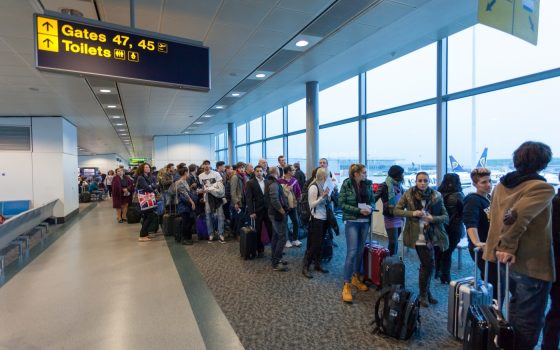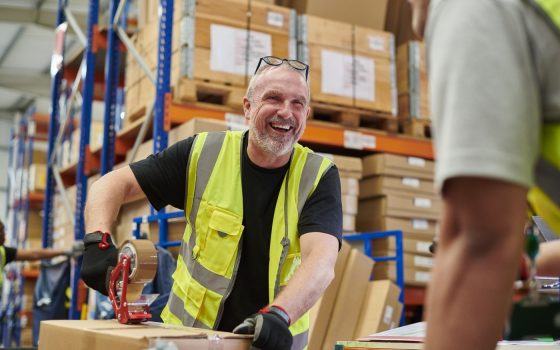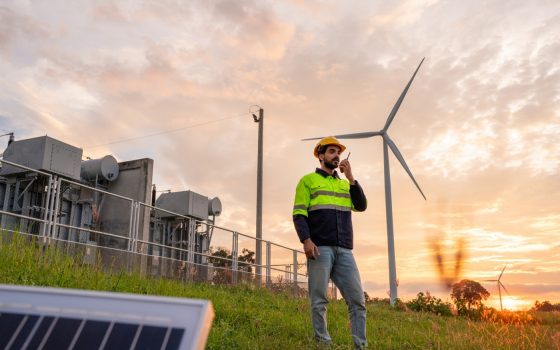Decarbonising our shops, supermarkets and warehouses
It's not just airlines and oil companies who will have to cut emissions — sectors like retail will have to change too.
11 October 2021
From how we generate our energy to where our food comes from, we all know that swathes of the British economy will have to change how they work if we want to tackle the climate crisis and meet our emissions targets. But it’s not just about ending fossil fuel use in our power plants and farms — other high-carbon industries will have to change too. And one of these industries is retail.
Supermarkets, independent shops and online shopping warehouses are all part of the retail sector. The sector has high carbon emissions because of both the fuel and electricity it uses to power premises and transport goods, and from the way the products it sells are manufactured. Retail is an industry beset by plastic packaging, intensive energy usage, and large and complex supply chains which carry significant global environmental impact. But retail isn’t seen as one of the big sectors that needs to be part of the transition to a zero-carbon economy — including by the people who work in the sector.
This is bad news — when a sector’s workforce isn’t aware of the massive changes that their industry will need to undergo, they won’t be in a position to influence this industrial change. As we saw during 1980s deindustrialisation, top-down change can have catastrophic consequences. I wanted to find out about the risks and opportunities of the transition to net-zero emissions in the sector, and what can be done to strengthen retail workers’ hands so they can lead this change. To do this, I spoke to a number of union activists in the retail sector.
Retail workers have little political engagement with unions, who might otherwise spearhead conversations around how workplaces could cut carbon without hurting their workers. These low levels of engagement are common in workforces like retail, where workers are often juggling multiple jobs. Many retail workers also have caring responsibilities: 58% are women, who disproportionately bear the burden of care work. What’s more, retail work is often gruelling, monotonous or low-paid — not ideal conditions for workers to give extra thought to whether their jobs are ‘green’. All this adds up to a lack of spare time for democratic workplace engagement — and it shows: less than 12% of retail workers are union members. This limits the union’s resources, reducing it to a pared-down service for times of hardship, rather than a political vehicle which can shape the future of the sector.
“Retail is an industry beset by plastic packaging, intensive energy usage, and large and complex supply chains”
But these low levels of engagement could be changing, because of an unlikely source: the pandemic. Mass redundancies have swept the economy. But in the parts of the retail sector which have stayed open, like supermarkets, there has been a hiring spree. As one union activist pointed out to me, this could mean workers coming into retail from industries with higher levels of union engagement — perhaps fresh from disputes about redundancies, or even conversations about workplace environmental policies. While pandemic mass redundancies are no cause for celebration, they could mean an injection of renewed campaigning energy and a demographic of workers with more time to give to union activities in the sector. And the shift to holding union meetings online could provide an additional boost.
Unions organising in retail can harness these opportunities to recruit members and use more radical, collective tactics to challenge poor employment practices, improve pay and conditions, and shape the sector’s green transition. There is already work being started by some unions, and unions lagging behind must step up too. Without them, retail workers will be left to the mercy of company-led policies to cut carbon. In many cases these amount to little more than corporate greenwashing, where high-carbon practices are simply shifted up the supply chain, or the costs of cutting carbon are passed onto workers. One Unite Hospitality organiser told me about large hotel chains using ‘green cleaning’ initiatives to give workers extra responsibilities but no extra time to complete them. The chains also attempted to lay off staff to offset the costs of green cleaning materials. If a green transition is to be both meaningful and ethical in its employment practices, unions, rather than companies, must lead the way.
However, the beginnings of a worker-led green transition in the economy at large are in germination. The Welsh Trades Union Congress (TUC) has launched a training pack for ‘green reps’, including activities for workers to contemplate what the future of their sector should look like. The large numbers of young workers in retail, who are typically very concerned about the climate crisis (almost half of 18- to 24-year-olds say that environmental issues are a top concern) might help with take-up of these trainings amongst retail workers. Other big unions, meanwhile, have started taskforces and included worker-led action on the environment as part of the standing agenda for regular regional and national meetings.
“… these low levels of engagement could be changing, because of an unlikely source: the pandemic.”
The possibilities for retail workers are huge. This is a workforce with little invested in it for upskilling, low levels of union density, and poor pay and conditions. Through concerted, union-led actions, workers could benefit from shaping the sector’s environmental impacts, and being reskilled in future-proof low-carbon jobs, or developing green tech skills. The issues of low wages and casualised contracts can be brought to the bargaining table as workers bring demands to employees for a green future. What’s more, through linking up with other sectors like agriculture, or with other unions globally, improvements to both environmental practices and workers’ pay and conditions could be demanded across the global supply chain. This would preclude costs to companies being shifted onto workers in the Global South.
I shared other opportunities and recommendations taken from my conversations with union activists in this briefing. As with all sectors facing transformative change as we move to a net-zero economy, workers — as those with most knowledge of the practices and processes of the industry — should be at the forefront of change. The retail sector is in a vulnerable position currently, but with collective, proactive action, a brighter and greener future — which brings with it improvements in workers’ pay and conditions — could still be won.
Image: iStock
Topics Work & pay Climate change Environment






